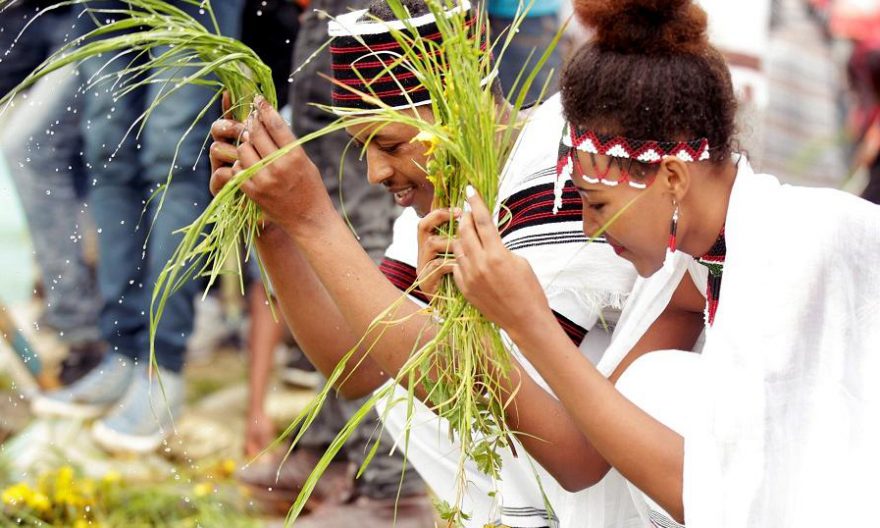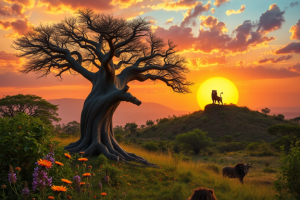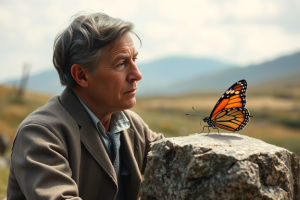
BY MULUGETA GUDETA
Dukem town on the eve of Irreechaa celebrations last week looked like a huge wedding ceremony where houses, public places, businesses as well as government premises were decorated with slogans and banners praising Irreechaa-2021 as a big moment for peace, unity and love. The three magical words were also inscribed on many banners and stickers. They reflect the present political and social situation in the country where the call for peace, love and unity has gained unprecedented attention.
Some of the business outlets had started preparing for the big holiday well before the eve. Some of them have painted their premises and done some face-lifting on their facades. Some of the slogans were written in English, Amharic or Oromiffa but their messages remained the same: Peace, love and unity in whatever order you put these three magical words. Peace is not more important than love or vice versa. Unity is not less important than peace. The three are mutually complimentary and equally important.
Irreechaa eve was a moment of preparation or dress rehearsal for next day. Of course the Irreechaa rituals take place annually at lake Hora not more than 12 km south of Dukem town. But, Dukem being so close to Bishoftu, she is bound to feel the heat of the festival. Residents travel to Lake Hora either on the eve or on the very morning of the actual festivities. The tougher ones even walk to Bishoftu driven as they are by the enthusiasm and the energy that is evident everywhere between the two towns. Settling between Dukem and the edge of Bishoftu, the rising and vibrant sunshine village also shares the enthusiasm and expectations of Irreechaa festivals.
A few years ago, Sunshine Village was a small settlement where new houses grew like mushrooms after a rainy day. Now the village boasts of being the residential area for young workers who are employed by the Pakistani and Indian enterprises around it, that give employment opportunities for tens of thousands of youngsters. Sunshine village is now a bustling and dynamic piece of housing estate where new businesses are growing and social services are available whereas they were unimaginable ten or so years ago.
More than an estimated 80 per cent of residents of sunshine village are young people below the age of thirty and as Irreechaaa has a huge appeal to the youths of the village. The village is also famous for its bars restaurants and mini-markets, new hotel buildings and recreational facilities. On the eve of the festival of Thanksgiving, almost all the young and older residents were dressed in special clothes that reflect the importance of the festival as well as the respect they harbor for it.
Speaking of dressing, the same could be said about Dukem town where almost all people in the streets were dressed in white, black and red clothes that bear the official colors of Oromia. Girls too looked gorgeous in their fancy dresses and multicolored necklaces and beads that add esthetic dimension to their dresses. Young people in their twenties and even younger held long sticks as they sang and danced to the tunes of Irreechaa traditional hymns or songs. Some of them were leaping into the air, performing difficult dance movements only young people could perform. Music was everywhere blasting from huge loud speakers especially used for the occasion.
In hotels, restaurants and business outlets, hosts are busying themselves with the difficult tasks of serving numerous customers at a given time. Irreechaa is always a good business opportunity for the hotel business in Dukem town and everywhere the festivals take place. Merry makers were drinking inside and outside the premises savoring fresh draft beer as well as wines they wash down the foods they were eating with. Dukem being famous for its meat joints where highly savory meat dishes are served, the number one choice for food lovers is of course raw meat, followed by roasted one and finely minced meat dishes mixed with butter, garlic and peppered with spices. They are mouth watering even when their aromatic smells filled your nostrils.
The evening on the eve of Irreechaa was quiet as people go home earlier to get enough sleep and energy to celebrate the main rituals next day. So, the streets were quieter than usual and the ubiquitous Bajaj scooters stopped giving service after 6:00 PM and the town went to sleep rather earlier than usual. Yet, by 6:00 AM next morning, the hustle and bustle of the small town could be heard even from a long distance. Church bells were tolling for Sunday mass while from the minaret in the main mosque called their followers for morning prayers. Soon groups of people were heading in the direction of Bishoftu town, some in cars and others on foot.
Television programs were broadcasting the events live as early as six o’clock in the morning and many of the marry makers had spent the night in Bishoftu, around the place where the rituals were taking place. There were also people who came from as far as Wellega, Jimma, the Southern region and from around the capital. Some of them had attended the Hora Finfinnee on Saturday and travelled to Bishoftu the same day to attend the Hora Arsedi rituals on Sunday. In Dukem town, the bedrooms in hotels were fully occupied by people who could not find shelter for the night in Bishoftu. So they had to travel back to Bishoftu next morning to be there in time for the rituals.
Sunday was of course the big day for Hora Arsedi and the number of people who attended it was staggering even judging from TV pictures. Dukem looked a bit deserted as all the guests had travelled to Bishoftu. Yet, this mood lasted only for almost half a day, until the people travelled back from Bishoftu and start the marry making, the eating, drinking, dancing and laughing.
By the way, speaking of the prices of foods during the Irreechaa celebrations in Dukem town from where this writer is reporting the events, hotel and restaurant owners apparently agreed to lower the price of food for this special occasion. It is as if they decided to provide better quality foods at lower prices. One kilogram of roasted meat cost you around 400 birr while the price on normal days was higher reaching as high as 600 birr.
This is a big improvement indeed. This writer wished that other service providers might follow this good example and lower prices so that people with little income could enjoy the foods and drinks. The cost of living being so high and beyond the means of people in the lower income group, service providers can only be commended for making even the smallest price cuts on such occasions.
Ozone International Hotel is by most the biggest hotel in Dukem town. It is usually considered the place of choice for people wining and dining on Sundays and coming from as far as from Addis Ababa for a weekend outing. It is a relatively modern place with modern services and domestic and foreign foods on their menus. Holidays like Irreechaa or the New Year are special occasions for the hotel that accommodates hundreds of guests in its rather larger premise where a water pool gives magnificent look to the whole place and add another dimension to its imposing structures.
Last Sunday, there was no vacant seat at the open-air hotel where people of different ages were celebrating Irreechaa, eating and drinking in the open and a band performing traditional dances to the tune of traditional music.
By noon on Sunday, all the hotels and restaurants in Dukm town were filled with guests and music was blaring from the loudspeakers. Small groups of youngsters travelled from one place to the other, performing the traditional Oromo dances and singing traditional songs in celebration of Irreechaa and the ideals for which it stands. These were the ideals of love, peace and unity, the three magic words that were on everyone’s lips.
Ethiopia needs peace at this particular time because it finds itself in the middle of a political crisis that has degenerated into warfare against anti-peace forces in the northern part of the country. In fact, Ethiopia has spent much of 2020 fighting against conflicts, massive displacements, random killings and so much suffering. The people seem determined not to allow a repeat of those ugly episodes that have left dark scars on the psyche of the country. No doubt that peace has become the number one priority for the majority of the people.
Of course the people of Ethiopia need peace because they want to go about their businesses knowing that their efforts at bettering themselves and the country are meant to pay dividends. They need peace in order to improve themselves and their country. Students need peace to continue their education without fear of attacks by the dark forces that are trying to prevent them from going to schools or colleges.
Merchants and businessmen in general need peace in order to bring their wares to the market and serve consumers with patriotic and civic responsibility. In brief, everyone in the country needs peace as they need air to breathe. This was the pervading feeling beneath the Irreechaa celebrations everywhere this writer tried to gauge the public mood.
Popular holidays like Irreechaa are not however only about eating and drinking and dancing and singing. They are also moments of reflections about the significance of the events. Peace is of course the major message or the bedrock of the stability and continuity of the country as a cohesive and sustainable polity. Love is also another pillar that is given priority during holidays. Peace without love is bound to sooner or later degenerate into misunderstandings and conflicts. So love among the people is a precondition for making peace genuine and durable.
Last but not least, unity is something that binds all these things together and gives them a higher significance. Peace and love for a country can only be appreciated in unity and in order to appreciate the three passions together, in a holistic state. That is why popular holidays in Ethiopia, whether they are based on Islam, Christianity or any other belief system, put these two themes, namely peace, love and unity, as their major concerns as a country. These ideals not only energize the people and give them hope. they are also the pillars that hold the country together and this was most evident on Irreechaa day and during the celebrations yet to come
The Ethiopian Herald October 7/2021




